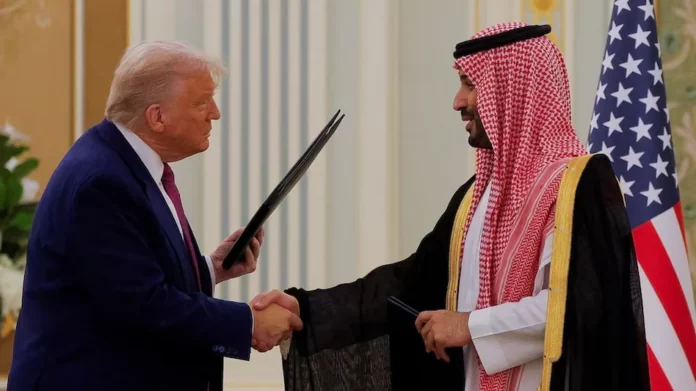The United Arab Emirates and the United States have signed a landmark agreement for the UAE to build the world’s largest artificial intelligence campus outside the U.S., signaling a shift in Washington’s approach to technology collaboration with allies.
The deal, finalized during President Donald Trump’s visit to Abu Dhabi on Thursday, represents a strategic breakthrough for the UAE as it seeks to strengthen ties with the U.S. while maintaining economic relations with China.
While details on specific AI chips were not disclosed, the agreement is expected to significantly expand the UAE’s access to advanced semiconductor technology, including high-performance chips from U.S. firms such as Nvidia. In a show of diplomatic and technological alignment, Nvidia CEO Jensen Huang was seen in televised footage engaging with President Trump and UAE President Sheikh Mohamed bin Zayed Al Nahyan at a palace meeting.
The agreement comes after years of restricted access to U.S. AI hardware under the Biden administration, which had expressed concerns about potential Chinese access to sensitive technologies through third-party nations. The new framework requires that U.S. companies operate the data centers in the UAE and offer American-managed cloud services, ensuring tighter oversight and security standards.
At the center of the agreement is a massive 10-square-mile AI campus in Abu Dhabi, which will feature 5 gigawatts of power capacity to support next-generation data centers. Construction will be led by G42, a state-backed AI firm, with American firms overseeing operations to maintain compliance with U.S. technology protocols.
The scale of the campus positions it as the most ambitious AI infrastructure project globally to date.
In parallel with the AI campus development, other U.S. technology firms are deepening their engagement in the region. Qualcomm will contribute to an AI-focused engineering center, while Amazon Web Services will collaborate with local partners on cloud adoption and cybersecurity initiatives.
The agreement includes provisions for the UAE to invest in and build data centers in the United States comparable in size and capacity to those being developed in Abu Dhabi. This mutual commitment reinforces the bilateral nature of the partnership and ensures that U.S. interests are preserved on both technological and national security fronts.
The shift in U.S. policy reflects a broader recalibration under the Trump administration, which has emphasized closer tech alignment with strategic allies. Trump’s AI advisor recently clarified that the previous administration’s export controls were not designed to hinder cooperation with friendly nations.
The UAE could be allowed to import as many as 500,000 of Nvidia’s top-tier AI chips annually starting in 2025 under this new framework.
This development follows the UAE’s increasing investments in global AI ventures, including partnerships with firms such as OpenAI and xAI. Microsoft also committed $1.5 billion to G42 in 2023, underscoring the Gulf state’s rising prominence in the global AI race.
As part of its efforts to align with U.S. standards, G42 has removed Chinese hardware from its infrastructure and divested from certain China-linked holdings.
Despite these moves, Chinese technology firms like Huawei and Alibaba Cloud continue to operate in the UAE, and concerns over indirect chip diversion remain. However, U.S. officials believe the new agreement offers a controlled pathway for technological collaboration without compromising security.
The deal marks a pivotal moment in global AI geopolitics and underscores the UAE’s growing role as a bridge between East and West in the emerging tech landscape.




